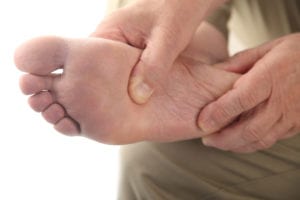 A slipped disc is usually a painful condition, but a mildly herniated disc may not cause severe pain. Some symptoms may seem so unrelated you could easily dismiss them as something else. (“I slept on it wrong” or “I need better walking shoes” or “I sat down too long” come to mind.) Oftentimes, patients sustain an injury to the back, think everything is fine again shortly afterward, but then experience other symptoms that don’t seem connected. Being able to identify secondary signs of a disc problem can help you better understand your body and determine whether a back issue is healing properly or needs further treatment.
A slipped disc is usually a painful condition, but a mildly herniated disc may not cause severe pain. Some symptoms may seem so unrelated you could easily dismiss them as something else. (“I slept on it wrong” or “I need better walking shoes” or “I sat down too long” come to mind.) Oftentimes, patients sustain an injury to the back, think everything is fine again shortly afterward, but then experience other symptoms that don’t seem connected. Being able to identify secondary signs of a disc problem can help you better understand your body and determine whether a back issue is healing properly or needs further treatment.
Do you have back pain or disc problems? Keller chiropractor Dr. Cody Doyle routinely treats patients for spinal disc issues, and may be able to help your condition. Contact our office at 817-767-5430 to learn about chiropractic and complementary therapies at Doyle Chiropractic and Acupuncture.
What is a Slipped/Herniated Disc?
The spinal discs are the rubbery tissues that cushion the vertebrae. They are composed of layers of fibrocartilage, which (1) allow the spine to be flexible, (2) serve as shock absorbers, and (3) hold the vertebrae together. When an injury is sustained, the discs can be damaged or pushed out of place. They can also be pushed out of alignment or leak fluid due to improper lifting, aging, and/or a combination of the two. A disc that bulges out of place or slips out of place entirely is a serious health concern, since it limits your mobility and can impair your spinal function.
If you’ve had chronic back pain or a recent injury that may have affected your back, be on the lookout for these “unrelated” signs that a disc may be misaligned:
Pain in Arm or Leg
All of our body’s nerves travel through the superhighway of the spinal column. If a bulging disc is compressing a nerve, you might feel pain in locations other than the back. Depending on the location of the affected disc, you might have unexplained pain that manifests in the arm, leg, or trunk of your body.
Coldness on One Side of the Body
When nerves are compressed, the sensations you feel may not always be painful. You might feel a burning, tingling, numbness, or even unexplained coldness that only affects a localized area.
Foot Pain or Numbness
If a bulging disc is affecting the sciatic nerve, it can send shooting pains down one side of the leg and into the tailbone. However, sciatic nerve pain can also cause you to feel pain or lose sensation only in the foot. You might feel it in the ankle, toe, or bottom of the foot, depending on the location of the nerve compression.
Pain When You Laugh or Cough
A hearty round of laughter can certainly make your abdominal muscles sore, but that’s not the type of pain that a herniated disc can cause. If you feel sudden pain when you laugh, cough, or sneeze, it may be from the pressure in your abdomen reverberating into your back and jostling the bulging disc.
Unexplained Weakness
In addition to tingling and numbness, nerve compression can also cause one leg or arm to feel significantly weakened or more heavy than the other. For example, compression of the sciatic nerve can cause muscle weakness in the calf and hamstring muscles. If a bulging disc is pinching a nerve in the upper back, the muscles of the arm may be affected.
Visit Keller Chiropractor Cody Doyle to Learn More
Visit Doyle Chiropractic and Acupuncture if you have pain or other symptoms that may be connected to a spinal issue. Keller chiropractor Dr. Cody Doyle will listen to your symptoms and take scans to determine the cause of your pain. Contact us online or by calling 817-767-5430 to find out whether a chiropractic and complementary therapies may offer relief for your condition.